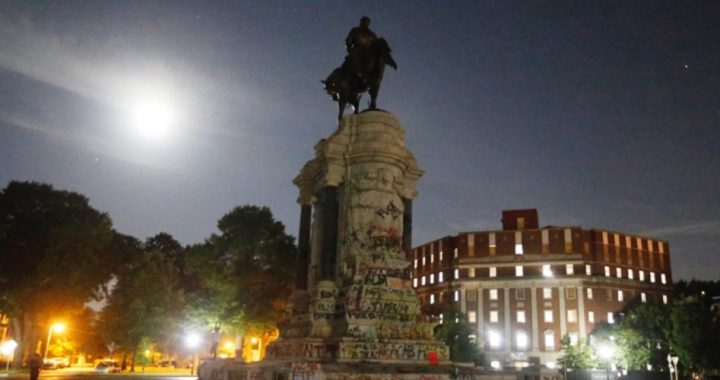
When Virginia Governor Ralph Northam ordered the removal of Robert E. Lee’s monument in Richmond, he did more than simply surrender to the demand of the radical Left and validate its false narrative that the Southerners who fought for the Confederacy were irredeemably evil.
He also declared war on a truth that American presidents, including Republian Dwight Eisenhower and Democrat Franklin D. Roosevelt, once recognized Lee as one of the greatest Americans in the history of our country.
Indeed, Eisenhower kept a portrait of Lee in the Oval Office, and FDR presided at the unveiling of Lee’s statue in Dallas, Texas, in 1936.
Eisenhower Letter
Eisenhower explained his admiration for Lee at length in a letter to a fellow who wanted to know the World War II commander so greatly admired a man who took up arms against the Union.
“The most outstanding thing that Robert E. Lee did, was to devote his best efforts to the destruction of the United States Government, and I am sure that you do not say that a person who tries to destroy our Government is worthy of being held as one of our heroes,” Leon Scott wrote on August 1,1960.
“Will you please tell me just why you hold him in such high esteem?”
Eight days later, Eisenhower penned a thoughtful reply that suggested a much deeper grasp of history than Northam’s.
“We need to understand that at the time of the War between the States the issue of secession had remained unresolved for more than 70 years,” Eisenhower began. “Men of probity, character, public standing and unquestioned loyalty, both North and South, had disagreed over this issue as a matter of principle from the day our Constitution was adopted.”
In other words, whether a state or states could secede from the Union was not only unsettled but also untested.
“General Robert E. Lee was, in my estimation, one of the supremely gifted men produced by our Nation,” Eisenhower wrote.
He believed unswervingly in the Constitutional validity of his cause which until 1865 was still an arguable question in America; he was a poised and inspiring leader, true to the high trust reposed in him by millions of his fellow citizens; he was thoughtful yet demanding of his officers and men, forbearing with captured enemies but ingenious, unrelenting and personally courageous in battle, and never disheartened by a reverse or obstacle. Through all his many trials, he remained selfless almost to a fault and unfailing in his faith in God. Taken altogether, he was noble as a leader and as a man, and unsullied as I read the pages of our history.
From deep conviction, I simply say this: a nation of men of Lee’s calibre would be unconquerable in spirit and soul. Indeed, to the degree that present-day American youth will strive to emulate his rare qualities, including his devotion to this land as revealed in his painstaking efforts to help heal the Nation’s wounds once the bitter struggle was over, we, in our own time of danger in a divided world, will be strengthened and our love of freedom sustained.
Such are the reasons that I proudly display the picture of this great American on my office wall.
Asked as a press conference whether he agreed with British Gen. Bernard Montomgery’s assessment that Lee should have been fired after he lost the Battle of Gettysburg, Eisenhower reminded the worthies of the press of what they see when they enter his office:
No doubt you’ve noticed that on the walls are the prints of four men, men that I consider, in my book, are about the four top Americans of the past. They are Franklin, Washington, Lincoln, and Lee. And anybody whoever tries to put me in any other relationship with respect Gen. Lee is mistaken.
Another of Lee’s admirers was Franklin Delano Roosevelt, who happily attended an unveiling of Lee’s statue at Lee Park in Dallas on June 12, 1936.
“I am very happy to take part in this unveiling of the statue of General Robert E. Lee,” FDR said. “All over the United States we recognize him as a great leader of men, as a great general. But, also, all over the United States I believe that we recognize him as something much more important than that. We recognize Robert E. Lee as one of our greatest American Christians and one of our greatest American gentlemen.”
Northam’s Move
Northam disagrees, and announced on Thursday that Lee’s vandalized statue will removed, while Richmond’s mayor, Levar Stoney, promised to tear down the other stars in the Confederate firmament as soon as the law allows.
Next month, the law permitting localities to decide whether to remove memorials, monuments, and statues takes effect. “In Virginia, we no longer preach a false version of history,” Northam said. “One that pretends the Civil War was about ‘state rights’ and not the evils of slavery. No one believes that any longer.”
And so “in 2020, we can no longer honor a system that was based on the buying and selling of enslaved people,” said the man who wore blackface in medical school.
The Left has been waging war on Lee for some time.
In 2003, the Robert E. Lee Council of Boys Scouts in Richmond changed the name it had since 1942.
In 2018, school board in Staunton, Virginia, voted to change the name of Robert E. Lee High School.
In February, the Fairfax County School Board decided to consider renaming Robert E. Lee High School in Springfield. The board dropped Confederate general J.E.B. Stuart’s name from a high school in Falls Church in 2017.
Photo: Statue of Robert E. Lee: AP Images
R. Cort Kirkwood is a longtime contributor to The New American and a former newspaper editor.



